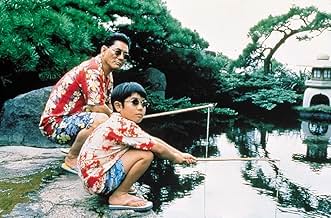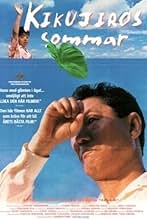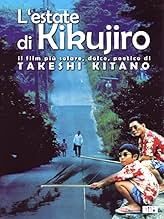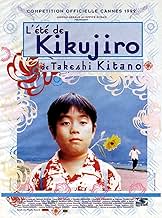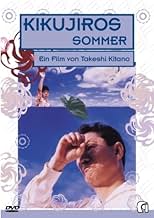IMDb रेटिंग
7.7/10
23 हज़ार
आपकी रेटिंग
एक युवा, भोला लड़का अपनी स्वच्छंद माँ को खोजने के लिए सड़क पर अकेला निकल जाता है. जल्द ही वह एक कट्टर आदमी में एक अप्रत्याशित रक्षक को पाता है और दोनों के साथ रास्ते में कई सारी अप्रत्याशित ... सभी पढ़ेंएक युवा, भोला लड़का अपनी स्वच्छंद माँ को खोजने के लिए सड़क पर अकेला निकल जाता है. जल्द ही वह एक कट्टर आदमी में एक अप्रत्याशित रक्षक को पाता है और दोनों के साथ रास्ते में कई सारी अप्रत्याशित घटनाएं घटित होती हैं.एक युवा, भोला लड़का अपनी स्वच्छंद माँ को खोजने के लिए सड़क पर अकेला निकल जाता है. जल्द ही वह एक कट्टर आदमी में एक अप्रत्याशित रक्षक को पाता है और दोनों के साथ रास्ते में कई सारी अप्रत्याशित घटनाएं घटित होती हैं.
- पुरस्कार
- 4 जीत और कुल 4 नामांकन
Takeshi Kitano
- Kikujiro
- (as Beat Takeshi)
The Great Gidayû
- Biker
- (as Gurêto Gidayû)
Beat Kiyoshi
- Man at Bus Stop
- (as Bîto Kiyoshi)
Yôji Tanaka
- Yakuza Henchman
- (as Yoji Tanaka)
फ़ीचर्ड समीक्षाएं
Kikujiro is a movie with beautiful calmness that's a great diversity from the fast cut movies today. Takeshi Kitano proofs once and for all, that he's a master filmmaker that will forever be remembered. And even though he dislikes the fame that goes along with his more successful movies (Zatoichi), it's a shame he doesn't get more recognition for his films.
Kikujiro no natsu tells the story of a kid who decides to visit his mother that he never met. Through odd circumstances kikujiro (Kitano), though absolutely unqualified, is forced to lead the kid. But as we see only moments later the boy would be better off alone, as kikujiro's fondness of gambling and (very amusing) way to treat people makes the journey a funny and quite touching odyssee.
What stands out in this movie is the simple comedy. It shows Kitano started off as a comedian, and his dialogue and acting made me almost spill my milk more than a few times. This is certainly one of his best. A great film for a quiet, rainy sunday afternoon.
Kikujiro no natsu tells the story of a kid who decides to visit his mother that he never met. Through odd circumstances kikujiro (Kitano), though absolutely unqualified, is forced to lead the kid. But as we see only moments later the boy would be better off alone, as kikujiro's fondness of gambling and (very amusing) way to treat people makes the journey a funny and quite touching odyssee.
What stands out in this movie is the simple comedy. It shows Kitano started off as a comedian, and his dialogue and acting made me almost spill my milk more than a few times. This is certainly one of his best. A great film for a quiet, rainy sunday afternoon.
Vignettes of childhood memories - possibly Kitano's own childhood experiences and impressions, "Kikujiro" is not like the deep or layered deliveries Kitano has in "Fireworks" (Hana-bi) 1997, or "Sonatine" 1994. There are no cops or graphic depictions of violence. There are still some gangster-type characters, but the encounters are simple, requiring no synthesis. Kitano's familiar elements and locales are present: drawings, vignettes, seaside, temple, and angels.
It's really a loving portrayal of one little boy, Masao's, summer, spent with this seemingly eccentric retired gangster "Mister" played by Kitano. We have a pair of comic bikers, a lone van traveler, an arguing truck driver, a fun juggling couple, prankish hitchhiking gags, and a rather extensive betting session at the (bicycle) races. There are occasions for sentimental tears, for instance, when "Mister" took a side trip to visit his own mother; but play is the key operative here. Even though the child appears to be a sulky non-smiling little boy most of the time, a boy will be a boy when it comes to play and open up to lightness of the heart.
If you're the hurrying kind, this film may not be for you. The film is at its own flow and pace. It's Masao's summer vacation adventures, and he's not in a hurry to go home. Joe Hisaishi's theme music for "Kikujiro" certainly is catchy and the score gave Kitano's film its rhythm and accents along this unlikely pair's journey - a grown man, who's become childlike once more while escorting Masao on his quest to fulfill the dream of seeing his mother. Does it matter whether Masao sees his mother or not? He gains a friend, Kikujiro.
Kudos to Sony Pictures Classics for their film distribution selections! At the recent Bravo cable channel's IFC (Independent Film Channel) tenth Gotham Awards, Catherine Deneuve presented the Industry Lifetime Achievement Award to the trio: Tom Bernard, Marcie Bloom, Michael Barker. It was noted: "This award is being created specifically for this year's ceremony to honor the trio for their 20 years of service as champions of independent filmmakers." Besides the theme from Woody Allen's "Sweet and Lowdown", Joe Hisaishi's music from "Kikujiro" was mostly used during the montage of the film clips. Films the trio has co-produced include the popular 1999 Tom Tykwer's "Run Lola Run" (German), Pedro Almodovar's 1999 triumph "All About My Mother" (Spanish), the Brazilian gem in 1998 "Central Station", Hal Hartley's 1997 saga "Henry Fool", John Sayles' 1996 hit "Lone Star", the 1995 French surprise "The City of Lost Children", and as far back as 1971 Vittorio De Sica's "The Garden of the Finzi-Contini".
It's really a loving portrayal of one little boy, Masao's, summer, spent with this seemingly eccentric retired gangster "Mister" played by Kitano. We have a pair of comic bikers, a lone van traveler, an arguing truck driver, a fun juggling couple, prankish hitchhiking gags, and a rather extensive betting session at the (bicycle) races. There are occasions for sentimental tears, for instance, when "Mister" took a side trip to visit his own mother; but play is the key operative here. Even though the child appears to be a sulky non-smiling little boy most of the time, a boy will be a boy when it comes to play and open up to lightness of the heart.
If you're the hurrying kind, this film may not be for you. The film is at its own flow and pace. It's Masao's summer vacation adventures, and he's not in a hurry to go home. Joe Hisaishi's theme music for "Kikujiro" certainly is catchy and the score gave Kitano's film its rhythm and accents along this unlikely pair's journey - a grown man, who's become childlike once more while escorting Masao on his quest to fulfill the dream of seeing his mother. Does it matter whether Masao sees his mother or not? He gains a friend, Kikujiro.
Kudos to Sony Pictures Classics for their film distribution selections! At the recent Bravo cable channel's IFC (Independent Film Channel) tenth Gotham Awards, Catherine Deneuve presented the Industry Lifetime Achievement Award to the trio: Tom Bernard, Marcie Bloom, Michael Barker. It was noted: "This award is being created specifically for this year's ceremony to honor the trio for their 20 years of service as champions of independent filmmakers." Besides the theme from Woody Allen's "Sweet and Lowdown", Joe Hisaishi's music from "Kikujiro" was mostly used during the montage of the film clips. Films the trio has co-produced include the popular 1999 Tom Tykwer's "Run Lola Run" (German), Pedro Almodovar's 1999 triumph "All About My Mother" (Spanish), the Brazilian gem in 1998 "Central Station", Hal Hartley's 1997 saga "Henry Fool", John Sayles' 1996 hit "Lone Star", the 1995 French surprise "The City of Lost Children", and as far back as 1971 Vittorio De Sica's "The Garden of the Finzi-Contini".
If it wasn't for the perverted old man and the language, this would probably be a really good children's movie. Who knows, maybe it's intended to be...
Anyway, little Masao lives with his grandmother and has never met his parents: his father is dead and his mother ran away. He knows where his mother lives, however, and wants to go visit her over the Summer, so his kindly neighbor conscripts her profligate husband to take him. "Mister", as Masao calls him, doesn't make the ideal companion with his absurd behavior and his verbal abuse, but they go off to adventure anyways and learn to really connect with each other.
The power this film has lies mostly in its contemplative approach. It's very humorous and isn't really slow, but the camera does take the time to linger on locales, faces, and characters. For a few odd parts here and there, it's still really innocent and it seems to show that most people are kind-natured at heart, even when they project an aura of toughness and abusiveness. An interesting aside to analyze that theme would be the carnival scene, where people entrusted with family entertainment turn out to be violent cheaters, whereas even the heavy-metal biker folk are more than willing to go out of their way to help Masao.
The film itself is from Masao's perspective, as a childhood's slightly photographic memory comes into play, mixed a lot with colorful imagination. The humor is the best part, as it is at times really simple but holds itself up well. There's a lot to enjoy in this film.
--PolarisDiB
Anyway, little Masao lives with his grandmother and has never met his parents: his father is dead and his mother ran away. He knows where his mother lives, however, and wants to go visit her over the Summer, so his kindly neighbor conscripts her profligate husband to take him. "Mister", as Masao calls him, doesn't make the ideal companion with his absurd behavior and his verbal abuse, but they go off to adventure anyways and learn to really connect with each other.
The power this film has lies mostly in its contemplative approach. It's very humorous and isn't really slow, but the camera does take the time to linger on locales, faces, and characters. For a few odd parts here and there, it's still really innocent and it seems to show that most people are kind-natured at heart, even when they project an aura of toughness and abusiveness. An interesting aside to analyze that theme would be the carnival scene, where people entrusted with family entertainment turn out to be violent cheaters, whereas even the heavy-metal biker folk are more than willing to go out of their way to help Masao.
The film itself is from Masao's perspective, as a childhood's slightly photographic memory comes into play, mixed a lot with colorful imagination. The humor is the best part, as it is at times really simple but holds itself up well. There's a lot to enjoy in this film.
--PolarisDiB
From its hauntingly beautiful soundtrack by Joe Hisaishi to the wonderful characters who inhabit Takeshi Kitano's magical Japan - everything in this movie comes together to make this one of modern cinema's truly underrated masterpiece.
The story involves a petty thug, Kikujiro, who is coerced into accompanying a young boy, Masao, on his cross country journey to find his birth mother. Along the way they meet a whole host of characters. Some friendly, some mysterious, some quirky, some abrasive, but all of them refreshingly human.
A lesser writer or director would have settled for a quick dose of weirdness from the main characters' fellow wanderers, but Takeshi Kitano milks them for all of the depth and endearment that the too few minutes we are graced with their presence allows.
If you enjoyed the whimsical, go-nowhere feel of Lost in Translation, you will LOVE this movie. In my opinion Beat Takeshi's efforts blow Sophia Coppola's out of the water.
Nine out of ten.
The story involves a petty thug, Kikujiro, who is coerced into accompanying a young boy, Masao, on his cross country journey to find his birth mother. Along the way they meet a whole host of characters. Some friendly, some mysterious, some quirky, some abrasive, but all of them refreshingly human.
A lesser writer or director would have settled for a quick dose of weirdness from the main characters' fellow wanderers, but Takeshi Kitano milks them for all of the depth and endearment that the too few minutes we are graced with their presence allows.
If you enjoyed the whimsical, go-nowhere feel of Lost in Translation, you will LOVE this movie. In my opinion Beat Takeshi's efforts blow Sophia Coppola's out of the water.
Nine out of ten.
Western audiences basically only know Beat Takeshi for his tough guy persona. Japanese audiences have seen many sides to him for a long time, and probably regard him as a comedian more than anything else. Maybe this is the reason why 'Kikujiro' isn't all that well known. Takeshi wrote and directed this movie as a follow up to his most celebrated work 'Hana-bi', but as it isn't a yakuza crime drama, it seems to have been largely overlooked. And that's a damn shame, because it's a very good movie, and anyone who enjoys Kitano's work will enjoy it. On paper the plot looks very Disney-like (grumpy old coot hits the road with an unhappy kid), but hey, this is Beat Takeshi, so what he does with it is always original and surprising. Much of the movie is playful, but then much of 'Sonatine' was too, only 'Kikujiro' doesn't mix that up with the orgy of violence you might expect from watching Kitano's better known movies. However it does have some dark moments that you would NEVER see in a Hollywood film dealing with similar "heart warming" subject matter, especially the "scary man" sequence featuring Akaji Maro, an actor you might recognise from Tarantino's 'Kill Bill'. I enjoyed 'Kikujiro' a lot, and the more Kitano movies I see, the more I think he is one of the most underrated directors working today.
क्या आपको पता है
- ट्रिवियाTakeshi Kitano made this gentler film as an antidote to his usual violent gangster movies.
- क्रेज़ी क्रेडिटThere's one more scene after the credits.
- कनेक्शनFeatured in Jam session - Kikujiro no natsu koshiki kaizokuban (1999)
- साउंडट्रैकSummer
Written by Joe Hisaishi
टॉप पसंद
रेटिंग देने के लिए साइन-इन करें और वैयक्तिकृत सुझावों के लिए वॉचलिस्ट करें
- How long is Kikujiro?Alexa द्वारा संचालित
विवरण
- रिलीज़ की तारीख़
- कंट्री ऑफ़ ओरिजिन
- आधिकारिक साइटें
- भाषा
- इस रूप में भी जाना जाता है
- Kikujiro
- फ़िल्माने की जगहें
- Sensoji Temple, Asakusa, Taito, टोक्यो, जापान(Masao and his friend walk across the temple grounds)
- उत्पादन कंपनियां
- IMDbPro पर और कंपनी क्रेडिट देखें
बॉक्स ऑफ़िस
- US और कनाडा में सकल
- $2,00,920
- US और कनाडा में पहले सप्ताह में कुल कमाई
- $28,079
- 28 मई 2000
- दुनिया भर में सकल
- $2,81,527
- चलने की अवधि2 घंटे 2 मिनट
- रंग
- ध्वनि मिश्रण
- पक्ष अनुपात
- 1.85 : 1
इस पेज में योगदान दें
किसी बदलाव का सुझाव दें या अनुपलब्ध कॉन्टेंट जोड़ें



